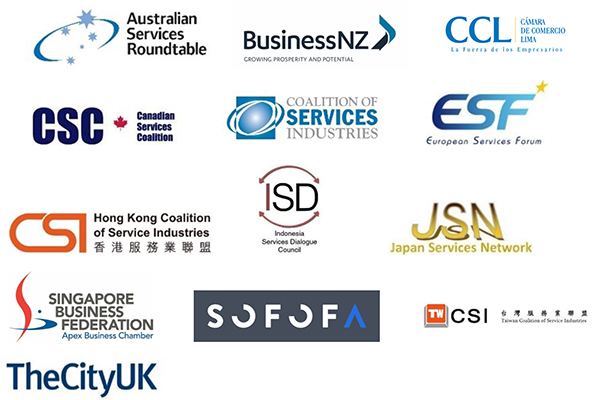
Global Services Coalition
Statement on WTO Priorities
The Global Services Coalition (GSC) speaks for the services sector in its members' respective economies on international trade and investment matters and represents these industries internationally. Services now account for half of global trade on a value-added basis and are on a faster long run underlying growth path than merchandise trade. Services industries are increasingly digital and much of the current and future growth of services trade is tied to the growth of digital trade and the rise in digitally enabled services — a trend accentuated by the global pandemic and unlikely to be reversed. At the same time, trade and investment restrictions, particularly impacting digital trade, are growing.
To ensure that services and digital trade continue to fuel economies worldwide and create new opportunities for jobs and greater inclusion at all levels of society, there needs to be a strong, revitalized World Trade Organisation (WTO). The GSC has been encouraged by the G7 Trade Ministers' Communiqué in May 2021, supporting the WTO Director-General in her efforts to modernise the WTO, and welcoming further cooperation through the G20 and with the wider WTO membership to make significant progress on WTO reform and to ensure the 12th WTO Ministerial Conference (MC12) delivers tangible results including on services.
Intensive progress over the coming months will be needed to achieve that end. The time between now and MC12 is a critical window of opportunity for making that progress. There is strong political will in government and the private sector to rebuild and expand opportunities and to close the digital divide in the global economy. There is a renewed belief in multilateralism and in cooperation between trade partners, in the wake of some of the beggar-my-neighbour policies that accompanied the spread of the pandemic. At the same time, the metrics monitored by international government agencies and respected academic observers, for example the OECD Services Trade Restrictiveness Index and the Global Trade Alert, are enough to underline the ongoing accumulation of barriers that threaten open trade in the global economy. These barriers must be addressed to secure greater global opportunity.
Agreement needs to be found on full restoration of the WTO's functionality across all its key areas of activity, including effectiveness in dispute settlement and as a forum for trade negotiations. For trade in services, progress in the Joint Statement Initiatives (JSIs) on Services Domestic Regulation and on E-Commerce are particularly important.
The GSC applauds the work that has been done, as noted in the G7 Leaders' Communiqué, to bring an outcome from the JSI on Services Domestic Regulation close to fruition and urges all WTO members to participate as soon as possible. Adoption of the outcomes of the JSI on Services Domestic Regulation should be an immediate top priority MC12 deliverable. WTO members should apply the proposed domestic regulation disciplines not only to services sectors subject to existing GATS commitments but also, to the extent possible, to services sectors where no specific commitments have yet been made.
GSC members also consider it critical for all WTO members — whether developed or developing — that the WTO Moratorium on Customs Duties on E-Transmissions be extended on a permanent basis. The Moratorium is a core pillar of the global foundation of the digital economy and a shining example of how the multilateral system can promote policies that foster innovation and growth, particularly for small and medium sized enterprises. As a minimum, GSC members urge all WTO members to ensure the Moratorium is extended at MC12 and well beyond the traditional 2-year extension period.
On the JSI E-Commerce negotiations, to which we attach especially high priority, we endorse the progress made and encourage further achievement of as much progress as possible by the time of MC12. This includes strong disciplines on data flows and data localization for all sectors; adopting a permanent ban on customs duties on e-transmissions; prohibiting mandatory transfer of source code or algorithms; market access commitments for e-commerce-related services; trade facilitation provisions; and promotion of risk-based cybersecurity measures. Commitments on market access need to include telecommunications, ICT, computer services, data processing, EPS and other financial services, distribution, logistics and enhanced business consulting and professional services.
The list of digital rules that we are proposing is not exhaustive and merely highlights some of the key elements that GSC members consider should be included in an e-commerce agreement. These rules must allow for data security and appropriate and effective protection of personal data, to be assured through compliance with local privacy and security regulations. Any exceptions to the principles promoting cross-border data flows and prohibiting forced localization should be limited to legitimate public policy objectives and only in full compliance with the provisions of GATS Articles XIV and XIV bis, and should provide for equal treatment to local and foreign services providers, without discrimination.
We urge the JSI E-Commerce co-convenors to propose a specific roadmap to ensure that negotiations on all aspects, including market access as well as a legal framework, move forward at a robust pace and conclude within a relatively short time after MC12.
- Australian Services Roundtable
- Business NZ
- Canadian Services Council
- Camara de Comercio Lima/Lima, Peru Chamber of Commerce
- Coalition of Services Industries
- European Services Forum
- Hong Kong Coalition of Service Industries
- Indonesia Services Dialogue Council
- Japan Services Network
- Singapore Business Federation
- SOFOFA/Chile
- Taiwan Coalition of Services Industries
- TheCityUK

